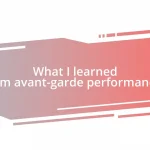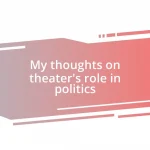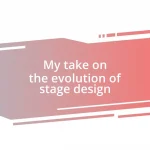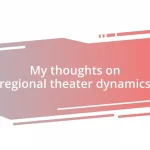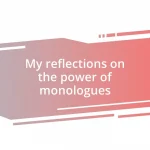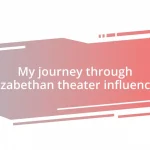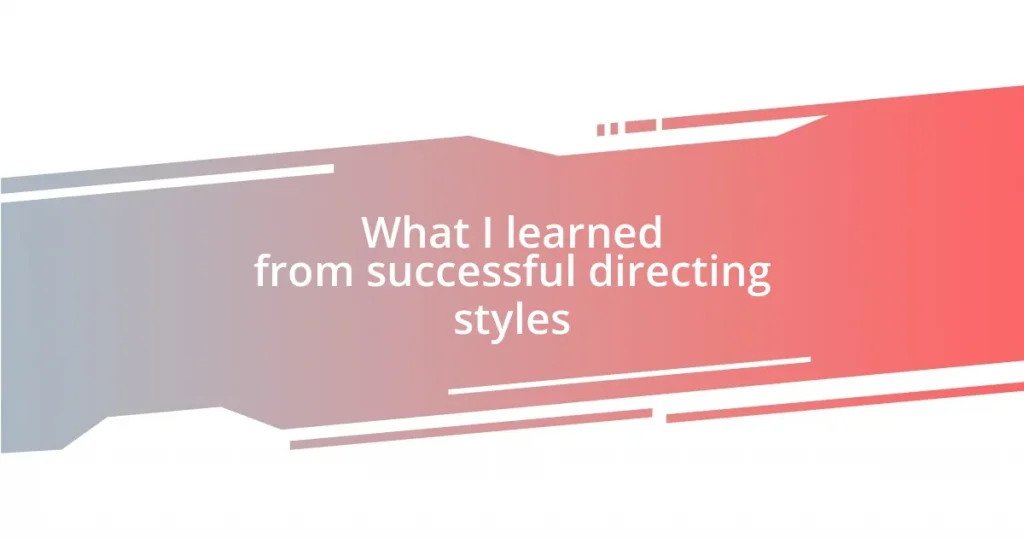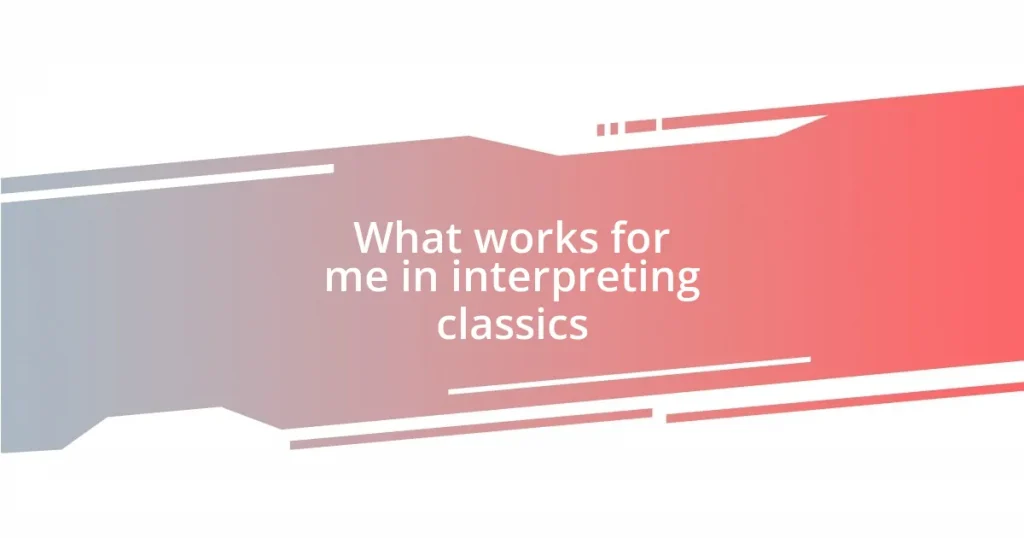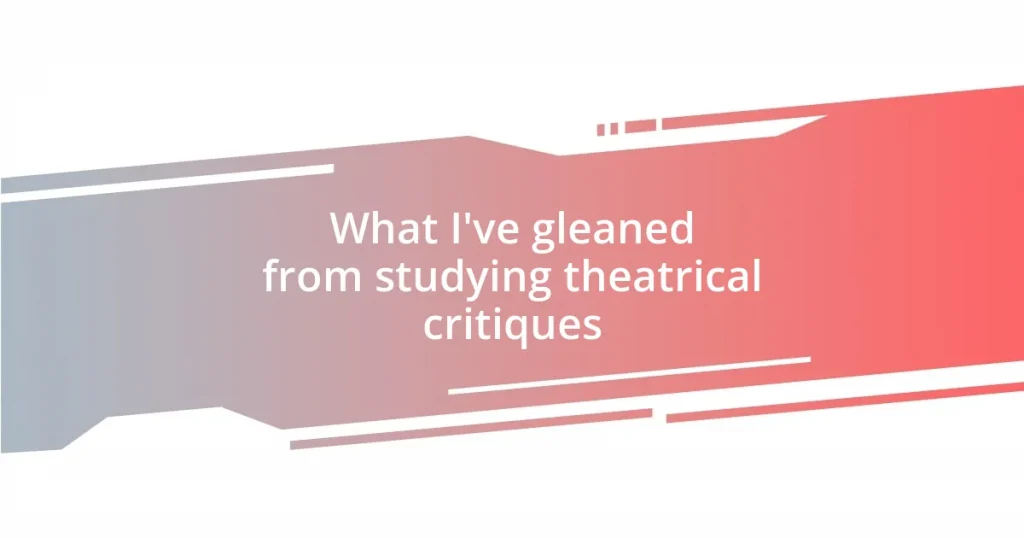Key takeaways:
- Ensemble acting requires trust, open communication, and vulnerability to create authentic performances.
- Active listening and collaboration allow for spontaneous moments that enhance the overall experience.
- Conflicts can lead to creative breakthroughs when approached with curiosity and a willingness to compromise.
- Empathy and understanding among cast members deepen emotional connections and elevate performances.

Understanding Ensemble Acting Basics
Ensemble acting is all about harmony. When I first joined an ensemble cast, I realized how crucial it is to listen to each other, not just to deliver lines. Have you ever noticed how a performance can feel lifeless if one actor is just waiting for their turn? That’s the magic of ensemble work—each member contributes to a living, breathing piece of art.
One of my most memorable experiences was during a community theater production. We spent countless rehearsals building trust and understanding among ourselves. I remember feeling a rush when our energies aligned on stage; it felt like we were one entity, each of us feeding off the other’s presence. Isn’t it fascinating how the whole can be so much greater than the sum of its parts?
Communication is key in ensemble acting. It’s essential to maintain an open dialogue both in and out of character. I often found myself having deep conversations with my fellow actors about our motivations and feelings, which not only enhanced our performances but also formed bonds that extended beyond the stage. Can you imagine the depth a scene gains when every actor is genuinely connected?

Importance of Collaboration in Theatre
Collaboration in theatre transforms individual performances into a cohesive experience. I distinctly remember a rehearsal where we were struggling to nail down a pivotal scene. Instead of pushing through on our own, we sat down together, dissecting each line and movement. That brainstorming led to an entirely different interpretation of the scene—one that was far more powerful and authentic than we could have achieved alone. It’s moments like this that showcase the extraordinary outcome of pooling our creativity with others.
- Learning to trust each other creates a safe environment for exploration.
- Diverse perspectives can spark innovative ideas that elevate the entire production.
- Collaboration fosters a sense of unity, making each member feel invested in the story.
- Open communication allows for constructive feedback, enhancing overall performance quality.
- Shared experiences forge strong relationships that often last well beyond the show’s run.

Techniques for Effective Ensemble Work
Ensemble work thrives on trust and vulnerability, something I learned early on. During one intense rehearsal, we worked on a dramatic scene where emotions ran high. Instead of merely acting, we shared our personal experiences related to the scene. This openness wasn’t just cathartic; it breathed life into our performances. When we connected emotionally, our chemistry on stage erupted, creating an atmosphere that was electric. Have you ever felt that kind of energy while performing or watching live theatre? It’s both thrilling and humbling.
Another vital technique is active listening. I recall a performance where one actor made a spontaneous choice that shifted the scene’s energy completely. I had to let go of my scripted plan and respond honestly in the moment. This moment of improvisation highlighted how important it is to be fully present with your fellow cast members. It’s exciting to realize that, with a little willingness, ensemble acting allows for unexpected and magical moments.
Lastly, rehearsal rituals can foster a deeper connection. In one production, we started every rehearsal with a simple circle where we would share our wins and worries. This practice established a strong foundation of camaraderie and empathy among us. I noticed how this format not only calmed nerves but also heightened our collective focus when we finally got on stage. It was as if our hearts beat as one, propelling us into every scene with confidence.
| Technique | Description |
|---|---|
| Trust and Vulnerability | Sharing personal stories enhances emotional connection among cast members, influencing the authenticity of performances. |
| Active Listening | Being present with fellow actors allows for spontaneous and organic reactions, making every performance unique and engaging. |
| Rehearsal Rituals | Establishing routines like sharing thoughts can strengthen bonds and create a supportive atmosphere that boosts confidence. |

Building Trust Among Ensemble Members
Building trust among ensemble members is fundamental for creating an authentic and engaging performance. I remember one particular moment during my early days in theatre when I was terrified to share personal insights with my cast. Yet, the moment I dared to open up in a rehearsal, sharing a vulnerable story related to our scene, I saw my peers’ faces light up with understanding. That connection not only eased my nerves but helped us all trust each other more deeply, knowing we were in a safe space to explore and experiment.
Have you ever felt that magical transformation when trust blooms between cast members? There was a time when we faced a particularly daunting scene that required raw emotional energy. Instead of relying solely on our scripts, we agreed to be completely honest about our feelings surrounding the topic. This act of vulnerability created a powerful bond among us; the fear of judgment vanished, and we unleashed a collective creativity that completely changed the dynamics on stage. It was incredible to witness how that trust elevated our performances.
Moreover, I’ve learned that consistency in showing up for one another builds further trust. In one ensemble, we had a tradition of sharing a brief moment of gratitude before every rehearsal. This simple act turned into a ritual that not only made us feel valued but also drew us together as a family. I firmly believe that when ensemble members are invested in each other’s journeys, they cultivate an atmosphere that fosters immense growth, both personally and collectively. Isn’t it heartwarming to know that the friendships formed in these moments can last long after the curtain falls?

Navigating Conflicts in a Group
Navigating conflicts in a group can often feel like walking a tightrope. I recall a rehearsal where two actors had opposing views about a crucial scene interpretation. Instead of rushing to a resolution, we decided to hold an open discussion. It amazed me how, after airing our concerns, we found common ground and created a blend of our ideas that enriched the performance. Have you ever experienced a situation where a disagreement led to something unexpectedly beautiful?
Conflict doesn’t have to be destructive. I’ve found that if you approach disagreements with a mindset of curiosity, it can transform tension into creativity. Once, during a heated debate about character motivations, one cast member proposed a completely different direction. Instead of shutting it down, we explored it together. That moment taught me that sometimes stepping away from our egos opens the door to greater collaboration.
Getting through conflicts is also about knowing when to compromise. I learned this during a production where I held firm to my vision for a character. After much back and forth, I finally agreed to try it another way, which surprisingly led to a performance that was richer and more layered than I could have imagined. Isn’t it remarkable how flexibility can lead to unexpected breakthroughs? Each conflict we face can become a stepping stone toward deeper understanding and stronger bonds in ensemble acting.

Insights from My Acting Journey
One of the key insights I’ve gained from my acting journey is the transformative power of empathy. I still vividly remember a scene where my character faced immense grief. During rehearsals, I found myself connecting with those feelings, not just for my own character but for my fellow cast members as well. Have you ever stepped into someone else’s shoes so deeply that it felt like your heart was woven into theirs? It was a beautiful moment of understanding, and it opened up avenues for authentic reactions that made our scenes resonate with the audience.
Another lesson that stands out is realizing the importance of active listening. In one particularly challenging rehearsal, we were rehearsing a complex emotional scene requiring genuine interaction. I noticed how tuning in to my fellow actors’ subtle shifts in emotion enriched our portrayal. It’s fascinating, don’t you think, how attuning oneself to another person’s energy can elevate a performance? That experience taught me that being present is not merely a skill; it’s a gift we give one another on stage.
I’ve also discovered that vulnerability can lead to remarkable breakthroughs. There was a time when I struggled with a specific character trait that felt foreign to me. Instead of masking that struggle, I shared it with my ensemble. The response was overwhelmingly supportive, and it sparked a candid conversation that led to collaborative exploration. Have you ever found that sharing your vulnerabilities not only lightens your load but also invites others to connect more deeply? Embracing that openness not only strengthened our ensemble bond but also enriched my performance in ways I never anticipated.

Key Takeaways for Aspiring Actors
As an aspiring actor, one of the most valuable lessons I’ve learned is the significance of trust within the ensemble. I remember a rehearsal where I had to perform a particularly vulnerable scene. Standing there, surrounded by my fellow cast members, I felt an overwhelming sense of support. Their unwavering presence allowed me to let down my guard, which in turn made the performance feel raw and genuine. Have you ever stepped onto a stage and felt that safety net around you? It’s this camaraderie that strengthens your ability to take risks and explore deeper aspects of your character.
Timing is another crucial element I’ve come to appreciate. There was a moment in a performance where the rhythm of our dialogue aligned perfectly, creating an almost magical connection among us. I could feel the audience hanging on every word, caught in the ebb and flow of emotion. Isn’t it fascinating how much timing can transform a scene? Learning to synchronize not just your lines but the energy and emotional beats with your ensemble can lead to unforgettable moments on stage.
Lastly, I believe humility plays a massive role in ensemble acting. I recall a time when I mistakenly overshadowed a fellow actor during a scene. The realization hit me hard; it wasn’t just about my performance. Subsequently, I made a conscious effort to step back, to uplift and spotlight others when appropriate. I was surprised at how this mental shift not only enhanced my ensemble’s dynamic but also sharpened my performance. What have you learned from your missteps? Sometimes embracing humility becomes the catalyst for growth, allowing all voices in the ensemble to shine brighter collectively.




